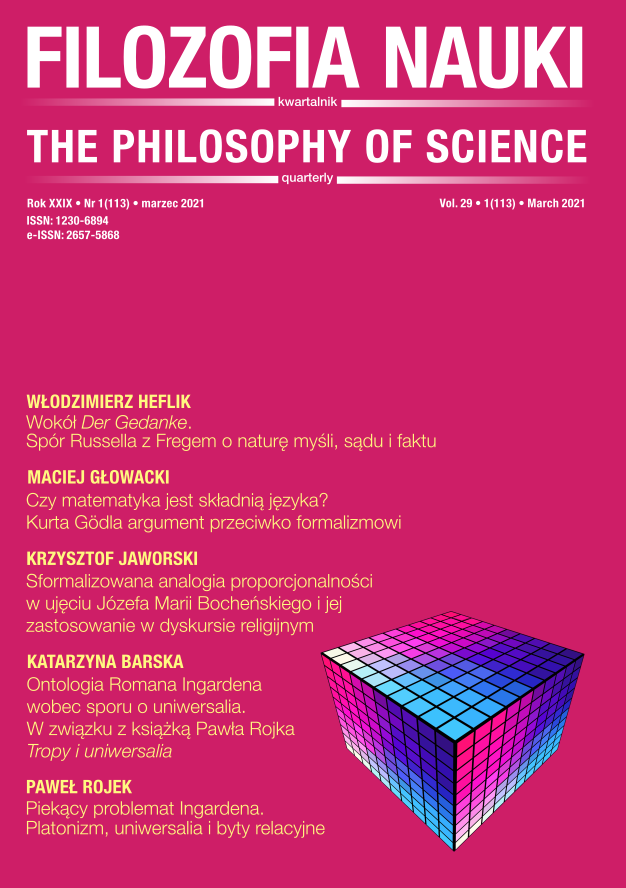Ontologia Romana Ingardena wobec sporu o uniwersalia. W związku z książką Pawła Rojka „Tropy i uniwersalia”
DOI:
https://doi.org/10.14394/filnau.2021.0004Słowa kluczowe:
universals, ontology, Roman Ingarden, Plato, properties, qualities, ideas, Forms, participation, transcendenceAbstrakt
This article is an attempt to defend two unfashionable positions in contemporary philosophy: Platonic realism and Ingarden’s rich ontology. This defense is in part prompted by the publication of Paweł Rojek’s book Tropy i Uniwersalia. Badania ontologiczne (Tropes and Universals: Ontological Investigations), in which the author maintains that both Platonic realism and Ingarden’s transcendental realism can be considered as a hidden nominalism. However, this statement: a) is
based on a specific interpretation of Platonism, b) narrows down the understanding of universals to only one sense of the term, c) involves misconceptions which are the result of the misinterpretation of Ingarden’s ontology — for instance, it is hypothesized that Ingarden’s main problem with the concept of universals is extreme separateness of properties from qualities (Ingarden’s ideal qualities may be interpreted as universals), d) takes a narrow view of the concept of participation, where the part—whole relationship is almost physical in character.
This paper attempts to show: a) that Plato’s and Ingarden’s theory of ideas (Forms) may also be open to other interpretations, b) that the assumption that universals are “one in many,” would make it difficult for anyone to be called a realist, or become a realist (there have been concerns as to whether all kinds of immanent realism correspond to the proposed definition), c) what is the source of various interpretations of participation, d) that arguments for the transcendence of universals are well-founded.
Bibliografia
Armstrong D. M. (1989), Universals: An Opinionated Introduction, London: Westview Press.
Barska K. (2013), Konkretyzacja — odpowiedniość czy uczestnictwo? [w:] Świadomość, świat, wartość. Prace ofiarowane Profesorowi Andrzejowi Półtawskiemu w 90. rocznicę urodzin, D. Leszczyński, M. Rosiak (red.) Wrocław: Oficyna Wydawnicza PFF, 279-290.
Barska K. (2014a), Negatywne stany rzeczy w ontologii Romana Ingardena, „Filozofia Nauki” 22(4) [88], 131-148.
Barska K. (2014b), Analiza typów bytowej niesamodzielności w ontologii Romana Ingardena, „Filo-Sofija” 14(25), 271-282.
Bergmann G. (1964), The Ontology of Edmund Husserl [w:] Logic and Reality, Madison: The University of Wisconsin Press, 193-224.
Bocheński J. M. (1993), Zagadnienie powszechników [w:] Logika i filozofia. Wybór pism, Warszawa: Wydawnictwo Naukowe PWN, 79-105.
Campbell K., Franklin J., Ehring D. (2019), Donald Cary Williams [w:] The Stanford Encyclopedia of Philosophy (Fall 2019 Edition), E. N. Zalta (ed.), https://stanford.io/3pC7ufZ.
Chrudzimski A. (2010), Composed Objects, Internal Relations, and Purely Intentional Negativity: Ingarden’s Theory of States of Affairs, „Polish Journal of Philosophy” 2(4). https://doi.org/10.5840/pjphil20104217
Chrudzimski A. (2011), Realistyczne teorie uniwersaliów [w:] Przewodnik po metafizyce, S. T. Kołodziejczyk (red.), Kraków: WAM, 127-159.
Dębiński B. (1997), Teoria idei. Ewolucja myśli Platońskiej, Katowice: Wydawnictwo UŚ.
Gadamer H. G. (1985), Platons Ungeschriebene Dialektik [w:] Gesammelte Werke, Bd. 6: Griechische Philosophie, Tübingen: Mohr Siebeck, 129-153.
Gałecki J. (1964), Istota istnienia [w:] Szkice filozoficzne. Romanowi Ingardenowi w darze, Z. Żarnecka (red.) Warszawa–Kraków: Państwowe Wydawnictwo Naukowe, 9-70.
Grygianiec M. (2000), Leśniewski przeciw powszechnikom, „Filozofia Nauki” 8(3-4) [31-32], 109-125.
Grygianiec M. (2001), Kotarbiński przeciw uniwersaliom, „Przegląd Filozoficzny — Nowa Seria” 8(3) [39], 95-114.
Hartmann N. (1966), Möglichkeit und Wirklichkeit, Berlin–New York: de Gruyter. https://doi.org/10.1515/9783110823882
Ingarden R. (1961), Spór o istnienie świata, t. 2, tłum. D. Gierulanka, Warszawa: Państwowe Wydawnictwo Naukowe.
Ingarden R. (1987), Spór o istnienie świata, wyd. III, tłum. D. Gierulanka, Warszawa: Państwowe Wydawnictwo Naukowe.
Johansson I. (2009), Proof of the Existence of Universals — and Roman Ingarden’s Ontology, „Metaphysica” 10, 65-87. https://doi.org/10.1007/s12133-008-0040-0
Judycki S. (2020), Epistemologia, t. II, Poznań–Warszawa: Wydawnictwo „W drodze”.
Kaczmarek J. (2006), Uniwersalia a przedmioty ogólne, „Acta Universitatis Lodziensis. Folia Philosophica” 17, 39-59.
Loux M. J. (2006), Metaphysics: A Contemporary Introduction, London–New York: Routledge. https://doi.org/10.4324/9780203968871
Moreland J. P. (2001), Universals, Chesham: Acumen. https://doi.org/10.1017/ UPO9781844653270
Nowak A. (2013), Historia i kres awersji. O ewolucji i znaczeniu Peirce’owskiej krytyki platonizmu [w:] Świadomość, świat, wartość. Prace ofiarowane Profesorowi Andrzejowi Półtawskiemu w 90. rocznicę urodzin. D. Leszczyński, M. Rosiak (red.) Wrocław: Oficyna Wydawnicza PFF, 253-277.
Oliver A. (1996), The Metaphysics of Properties, „Mind” 105(417), 1-80. https://doi.org/10.1093/mind/105.417.1
Orilia F., Paolini Paoletti M. (2020), Properties [w:] The Stanford Encyclopedia of Philosophy (Winter 2020 Edition), E. N. Zalta (ed.), https://stanford.io/2Zqn9UQ.
Penrose R. (2007), Droga do rzeczywistości. Wyczerpujący przewodnik po prawach rządzących wszechświatem, tłum. J. Przystawa, Warszawa: Prószyński i S-ka.
Piwowarczyk M. (2014), Krytyka realizmu immanentnego w kwestii uniwersaliów — argument z oddzielenia, „Filozofia Nauki” 22(4) [88], 109-130.
Piwowarczyk M. (2020), Platonizm a spór o uniwersalia. W związku z książką Pawła Rojka Tropy i uniwersalia, „Filozofia Nauki” 28(2) [110], 113-133. https://doi.org/10.14394/filnau.2020.0012
Platon (1959), Menon, tłum. W. Witwicki, Warszawa: Państwowe Wydawnictwo Naukowe.
Platon (2010), Państwo, tłum. W. Witwicki, Warszawa: Wydawnictwo Naukowe PWN.
Platon (1961), Parmenides, tłum. W. Witwicki, Warszawa: Państwowe Wydawnictwo Naukowe.
Rojek P. (2008), Trzy pojęcia uniwersaliów, „Kwartalnik Filozoficzny” 36(3): 45-61.
Rojek P. (2019), Tropy i uniwersalia. Badania ontologiczne, Warszawa: Wydawnictwo Naukowe Semper.
Ross D. (1951), Plato’s Theory of Ideas, Oxford: Oxford University Press.
Simons P. M. (1995), Kategorie i sposoby istnienia [w:] W kręgu filozofii Romana Ingardena, W. Stróżewski, A. Węgrzecki (red.),Warszawa: Wydawnictwo Naukowe PWN, 63-77.
Szymura J. (2011), Nominalizm [w:] Przewodnik po metafizyce, S. T. Kołodziejczyk (red.), Kraków: WAM, 161-210.
Widomski J. (2003), Platońska teoria partycypacji a problem konkretyzacji w filozofii Romana Ingardena [w:] Wielkość i piękno filozofii, J. Lipiec (red.), Kraków: Wydawnictwo Collegium Columbinum.
Williams D. C. (1997), The Elements of Being: I [w:] Properties, D. H. Mellor, A. Oliver (eds.), Oxford: Oxford University Press, 112-124.



















 Filozofia Nauki | ISSN 1230-6894 | e-ISSN 2657-5868
Filozofia Nauki | ISSN 1230-6894 | e-ISSN 2657-5868